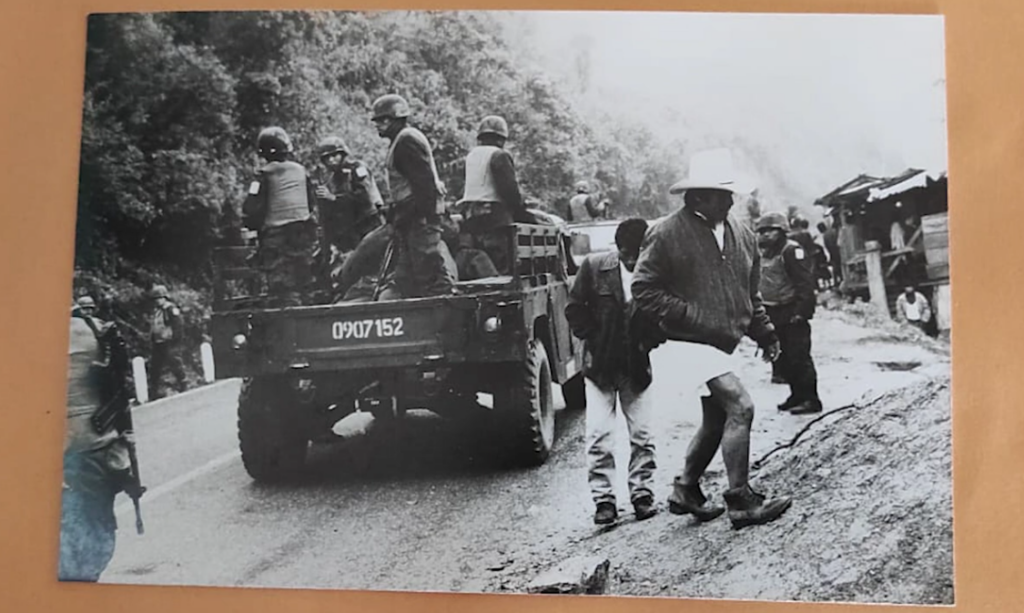Magdalena Gómez
Among the many cases of human rights violations in our country, a campaign is underway to stop the war in Chiapas against the Zapatista communities. This war affects not only them, but has become naturalized as a complex pattern in many regions of the national territory. All of which, without a doubt, places the focus of attention on the Mexican State, not only on the current government and administration, but on the structural non-compliance, by either action or omission, of a central function of the State, which is to guarantee respect for the human rights of all without any distinction whatsoever. For the victims, their families and the human rights organizations, the struggle against impunity is present, as is the inalienable decision to use the legal spaces within their reach at all levels, national and international –the little windows or vents, as the Mixe leader Floriberto Díaz Gómez used to say– not to mention the need to maintain the effort in the dissemination of these struggles to achieve commitment and social awareness in this regard. Always facing the risk that prior to receiving justice we may suffer the official criminalization of its advocates in a clear example of shooting the messenger in order to kill the message.
In this same context, today we call attention to the case of Antonio González Méndez, a member of the civilian base of the EZLN, who was disappeared on January 18, 1999 by the paramilitary group Paz y Justicia (Peace and Justice), which operated in municipalities in the northern zone of Chiapas, within the framework of the counterinsurgency policy implemented by the Mexican State after the uprising of the EZLN. As we know, a central part of this policy was the formation of paramilitary groups against civilians, whose objective was to create a state of terror that would prevent the communities from supporting the insurgency.
Faced with the adverse national context for justice, Antonio’s family and the Fray Bartolomé de las Casas Human Rights Center (Frayba) decided to go to the Inter-American Human Rights System in 2000 to sue the Mexican State for his disappearance and the impunity.
After a long international process, the Inter-American Commission on Human Rights (IACHR) issued its background report in 2019, and acknowledged that the State’s counterinsurgency policy had been demonstrated, as well as the State’s participation in the formation of paramilitary groups, and that Paz y Justicia was one of them. It also demanded that the facts be investigated and that Antonio be searched for in this context.
The Mexican government, in times of the so-called Fourth Transformation, decided to give a minimal, procedural response to the background report: the Undersecretary of Human Rights, Migration and Population offered a public apology in which he acknowledged the context of the disappearance. To date, no actions have been taken to search for Antonio Gonzalez, and even less have lines of investigation been considered in accordance with the internationally recognized context of counterinsurgency.
Given the continuing failures of the State, the case was finally presented before the Inter-American Court of Human Rights (IACHR), before which the Mexican government once again denied the counterinsurgency policy. Frayba has denounced that such a position in fact makes it an accomplice of the previous governments, and responsible for the psychosocial effects that continue to be produced by the lack of truth for the victims of paramilitarism in Chiapas, as is the case of the survivors of the Acteal massacre, or the relatives of the other 37 disappeared and 85 people executed by Paz y Justicia.

Frayba is announcing that the hearing of the case before the Inter-American Court will be held in the next few days. It highlights and draws attention to the fact that this is the first case that the Court has heard in this context, and implies a new opportunity for the Mexican State to be ordered to recognize the truth about this chapter in history, as well as to finally commit to making reparations to all the victims of its criminal policy. It is emphasized that the Inter-American Court can strengthen the historical demand for the Mexican State to recognize that the disappearance of Antonio González Méndez was committed as part of its counterinsurgency policy in Chiapas during the 1990s. Likewise, the ever-present urgency of an exhaustive search for him, and definitive recognition of the truth and responsibility for all the crimes committed during this period. Because it is not just about one case and one missing person.
We are talking about setting an essential precedent to speak with confidence about the rule of law in the country.
Original article published in La Jornada on June 20th, 2023. https://www.jornada.com.mx/2023/06/20/opinion/018a2pol
English translation by Schools for Chiapas.
